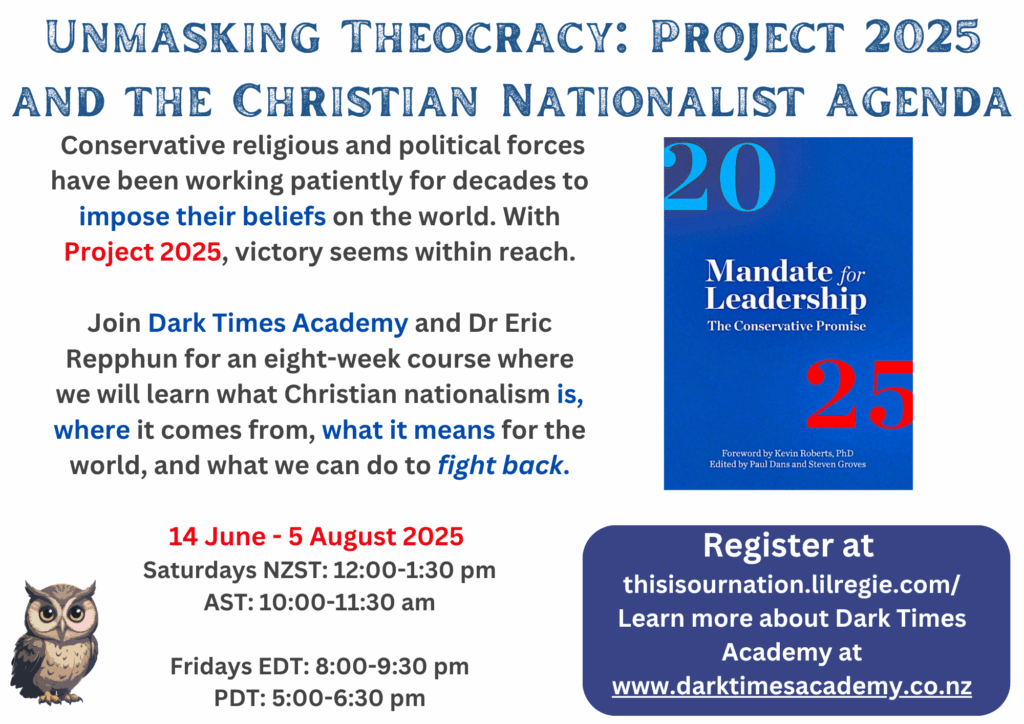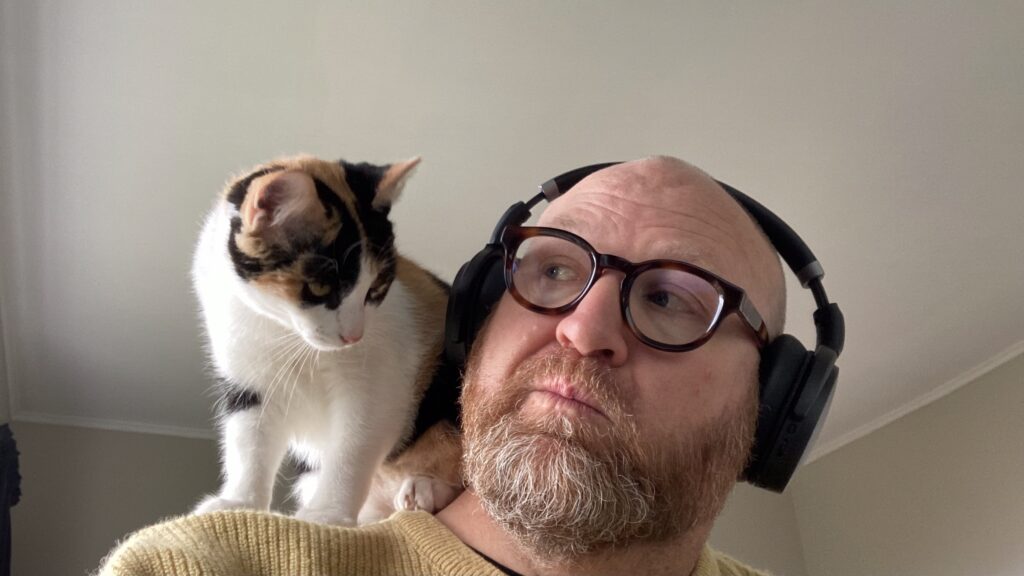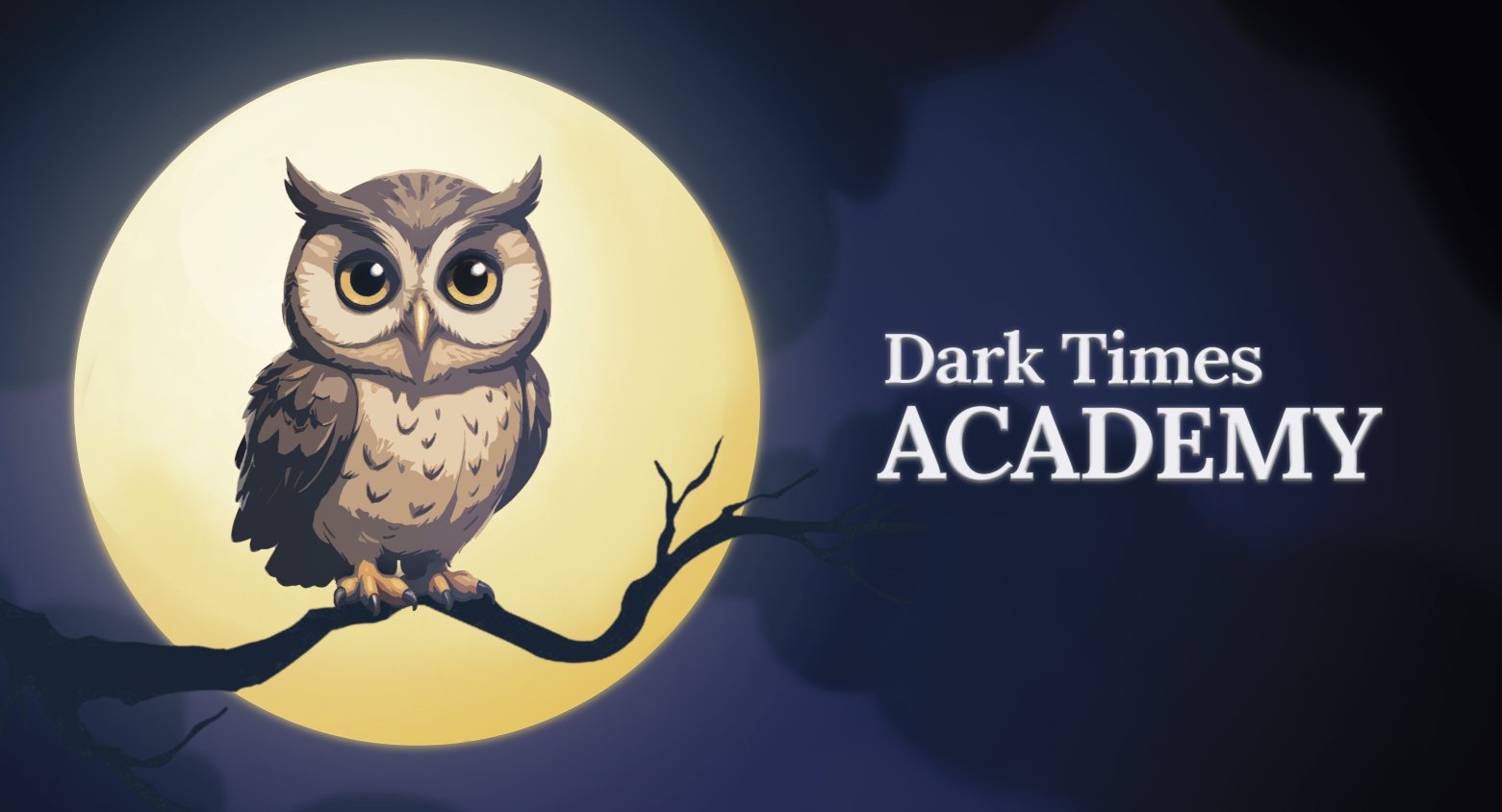
Register here
How this course works
Taking inspiration from the long history around the world of folk education, particularly the Scandinavian and Appalachian traditions, this course is designed to offer a fun, affordable and rigorous experience–that serves the needs of working adults.
Like all folk education, liberation and movement building is at the core of the course. We save ourselves together–and we educate ourselves to build solidarity, share tactics, and create a shared vision for a better future for all of us.
There’s no grades, no assessments, no credentials.
This is about learning for the love of learning and the love of each other.
Course Objectives
- Understand who Christian nationalists are, what they believe, and the stories they tell about their faith and its rightful place in human society.
Convener Info

Dr. Eric Repphun has worked as a university lecturer, an instructional designer, and journal co-editor, among many other things. He has a PhD in Religious Studies and has published original research on Mormonism in Battlestar Galactica, religion in the work of Douglas Coupland and Chuck Palahniuk, and different ways to understand the perverse biblical story of the sacrifice of Isaac. He has spent way too much time thinking about the idea of re-enchantment, or how modernity produces its own monsters and its own forms of unreason.
Session times
This class meets online once a week for activities, discussion, and guest lectures. If you can’t make it, we will seek consent from the group and our guest to record and share the lecture.
We meet:
Saturdays 12:00-1:30pm (NZST), 15 June – 5 August 2025
Course Tools
- Zoom, links will be sent out via email shortly before each class session begins
- Signal (optional)
We will be offering an optional “tech support session” early in the course so that you can ask questions, get help with Signal, and try out the tech tools we will be using.
Please come along if you need any help feeling comfortable with the tools we are using. If you aren’t comfortable with technology, please don’t worry! We will be happy to help you out and work to increase your comfort level.
Model for Each Week and Expectations
Each week will include a 20-minute pre-recorded lecture with an expert guest and a 90-minute Zoom class session to talk with the guest and explore their thoughts and ideas about what we should be doing in this moment.
We will also provide a list of resources including readings, podcasts, and videos for each week–representing the best work from our expert guest.
You can choose to engage with these as we go along or save them for later. I am happy to assist you in using your local library to access materials that aren’t available online. Just send an email to mandy@darktimesacademy.co.nz and I can schedule a session with you to explore your local options.
Course dates and times
Zoom sessions
14 June – 5 August 2025
Saturdays (NZ/AUS)
NZST: 12:00-1:30 pm
AST: 10:00-11:30 am
Fridays (USA)
EDT: 8:00-9:30 pm
PDT: 5:00-6:30 pm
Course Outline
Course Outline
Week 1: Course introduction – Project 2025 and the contradictions and dangers of Christian nationalism
IN our first week, we will start with a very zoomed-out view and will define the terrain we are going to cover and glance over the “Mandate of Leadership” document from Project 2025. We will ask ourselves a series of questions: What is Christian nationalism? What are the dangers it poses? What contradictions are encoded within its ideas and practices? How do we approach Christian nationalism as scholars, researchers, and humans?
Week 2: Christian nationalist ideas and stories
IN our second week, we will dig more into Christian nationalist ideology, theology, and the narratives. What do Christian nationalists believe? Are these beliefs shared by all Christian nationalists, or are there internal disagreements? What stories does Christian nationalism tell about themselves, faith, religion, and government?
Optional reading to whet your appetite: “Mooring Christian Nationalism: How Religious Institutions, Participation, and Beliefs Inform Christian Nationalism”, by Darren E. Sherkat, Derek Lehman, and Nabil Bill Julkif.
Week 3: Using words to order and divide people
IN our third week, we will delve into how Christian nationalists – and right-wing Christian extremists more broadly – use and abuse language, including how the movement reframes and redefines common words and concepts like “religious freedom” to further its own political and cultural goals. We will also explore how Christian nationalism seeks to impose a gendered and racialised order on human society through coded language and other means.
Optional reading to whet your appetite: “The Christian Reconstruction Movement in U.S. Politics”, by Julie Ingersoll; and/or “I Grew Up Evangelical and the Christian Nationalist Insurrection Did Not Surprise Me, by Deirdre Sugiuchi
Week 4 : Is Christian nationalism a set of beliefs or an identity?
IN our fourth week, we will take a break from all the words and get into some statistics. Who calls themselves a Christian nationalist? How do Christian nationalists understand themselves and their movement? At the same time, we will confront a very difficult question: is Christian nationalism defined by a set of beliefs and practices, or is it merely an identity? We will also engage with what we might call a “soft Christian nationalism”, which pervades the thinking of far-right but not explicitly Christian nationalist figures like Jordan Peterson.
Optional reading to whet your appetite: “Christian Nationalism and Political Violence: Victimhood, Racial Identity, Conspiracy, and Support for the Capitol Attacks”, by Miles T. Armaly, David T. Buckley, and Adam M. Enders.
Week 5: Christian Purity Culture and the War on Bodies
IN week five, we will grapple with some of the most confronting material in this entire course when we examine how Christian nationalism seeks to control, define, and even define out of existence certain kinds of human bodies. We will delve into the anti-abortion movement, which is a defining part of Christian nationalism, and will also explore how Christian nationalist ideas about purity and pollution define sex, sexuality, gender, and ethnicity. Which bodies are pure? Which threaten the nation with pollution, and what does this mean for how Christian nationalism treats women, LGBTQIA+ people, and other marginalised groups?
Optional reading to whet your appetite: “Decolonizing Purity Culture: Gendered Racism and White Idealization in Evangelical Christianity”, by Madison Natarajan, Kerrie G. Wilkins-Yelhttps, Anushka Sista, Aashika Anantharaman, and Natalie Seils
Week 6: Declaring war and creating enemies
IN our sixth week, we will look at how the language of warfare defines non-Christians and others as enemies, and what this means at the level of geopolitics. Who is allowed to have authority, and who must be subjected to authoritarian control?
Optional reading to whet your appetite: “Straight Man’s Burden: The American roots of Uganda’s anti-gay persecutions” , by Jeff Sharlet; and/or “A New Satanic Panic,” by Jonathan Booth
Week 7: Open week / guest speaker(s)
IN our penultimate week, we will catch up with anything we have had to skip, synthesise what we have learned, and discuss any questions that have arisen or any topics anyone wishes to raise. This is a reserve week or one that we can use for guest speakers, debates, etc.
Week 8: How can we fight back?
IN our final discussion, we will focus on some methods for combating Christian nationalism, taking inspiration from both outside of and within the Christian religious tradition, which has a deep history of social justice activism, from the Quakers who played a major role in the abolition of slavery in the United States to many prominent leaders of the Civil Rights movement. We will look at and discuss some ways people are fighting back, rejecting the imposition of narrow, exclusionary ideas about religion, bodies, order, violence, and identity.
Optional listening to whet your appetite: Conspirituality podcast episode 199: Inside Anti-Abortion Christian Nationalism (w/Rob Schenck)
